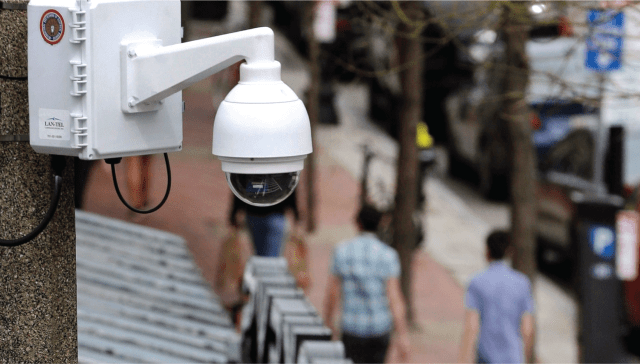
Facial recognition technology dates back to the 1960s, with techniques that relied on hand coding facial features of each face in the database. The rise of massive databases, automation, complex analytical tools and machine learning has vastly transformed the capacity and reach of this technology. Facial recognition is now used in a variety of contexts, such as unlocking a phone with the user’s face, diagnosing certain diseases and finding lost pets.
Perhaps one of the most well-known applications of facial recognition technology is law enforcement, where agencies can use it to find missing people, aid in solving crimes and help monitor large crowds of people. There is not comprehensive data about how many law enforcement agencies use facial recognition technologies. The federal Government Accountability Office reported in July 2021 that 42 federal agencies that employ law enforcement officers have used facial recognition technology in one form or another. The capacity of law enforcement organizations to identify faces has prompted both controversy and excitement over the years. While some say they appreciate how the technology can aid in policing, others have concerns regarding how police use of it can impact privacy and how inaccurate it can be when it comes to identifying Black and Hispanic adults.
This study explores Americans’ thoughts and perspectives regarding widespread use of facial recognition technology by law enforcement and beyond. It finds that majorities of the American public believe widespread use of facial recognition would likely help find missing persons and solve crimes, but majorities also think it is likely that police would use this technology to track everyone’s location and surveil Black and Hispanic communities more than others. In terms of potential impact, 46% of U.S. adults say widespread use of facial recognition technology by police would be a good idea for society while 27% believe it would be a bad idea. An additional 27% say they are unsure whether it would be a good or bad idea for police to widely use facial recognition technology.
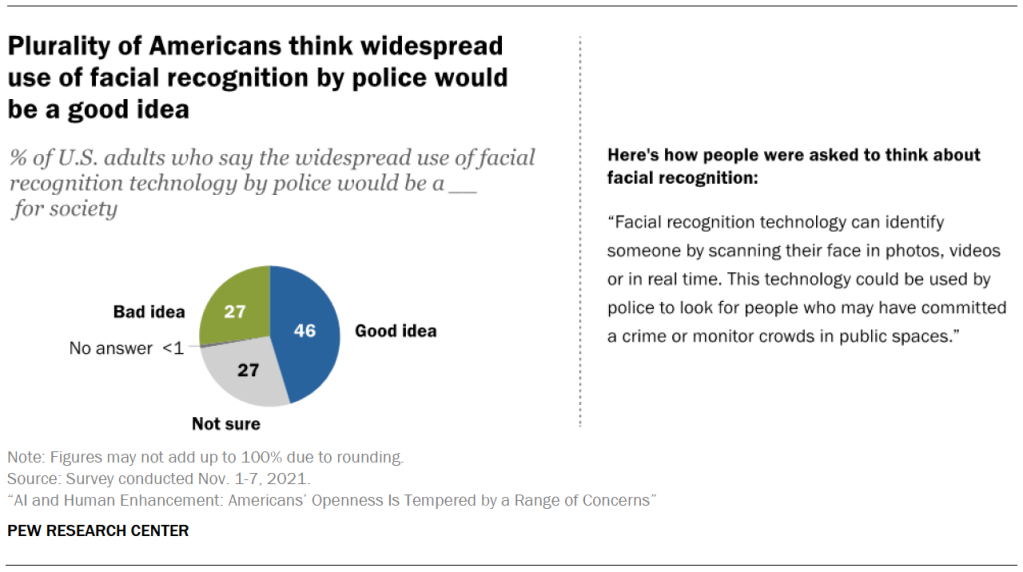
More see the widespread use of facial recognition technology in policing as a good than bad idea, but a majority says it won’t change crime rates
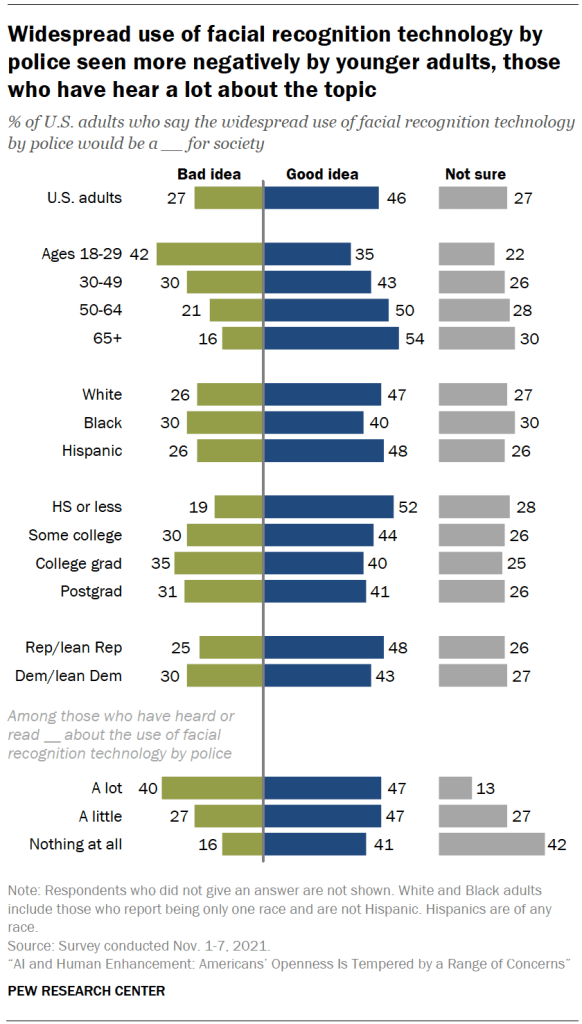
Facial recognition technology use by police has generated media attention, which has not gone unnoticed by the public. Eight-in-ten Americans say they have heard or read at least a little about the use of facial recognition technology by police, with 21% having heard a lot.
Adults 50 and older are more likely than those under 5o to say widespread use of facial recognition technology by police would be a good idea for society (52% vs. 40%). Similarly, 52% of adults with a high school diploma or less say it would be a good idea, while somewhat smaller shares of those with more formal education say the same.
People who have heard or read a lot about the use of facial recognition technology by police are more likely to say it’s a bad idea for society, compared with those who have heard a little or nothing at all on the topic.
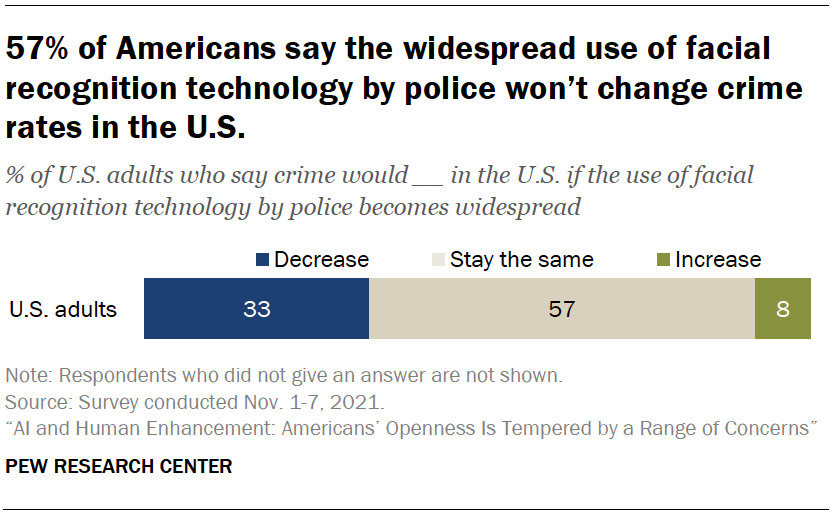
While a plurality of Americans think widespread use of facial recognition by police is a good idea, a majority are not convinced such usage would cut crime. Some 57% say crime in the U.S. would stay about the same if the use of facial recognition technology by police becomes widespread and 8% say crime would increase. A third of Americans think crime would decline if police used facial recognition widely.
Majorities say wide use of facial recognition technology would help police find missing persons, solve crimes but also lead to less privacy
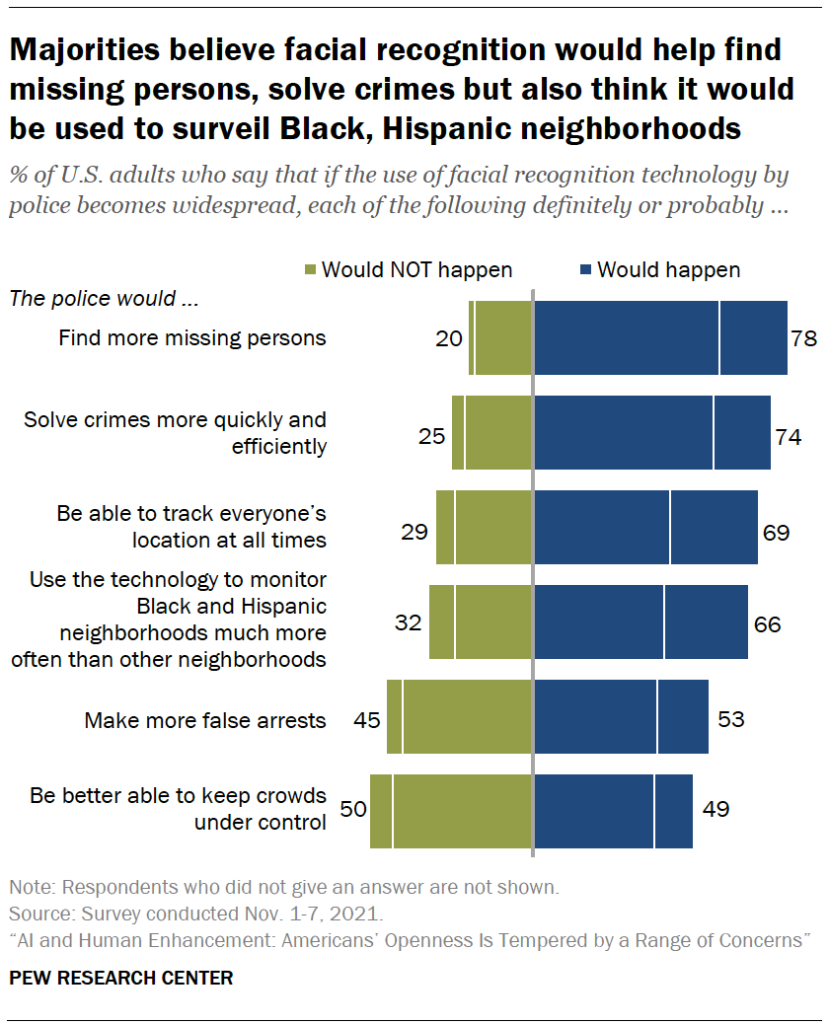
Americans see widespread use of facial recognition technology by police as likely to usher in both benefits and risks. In terms of potential benefits, about three-fourths or more say police would probably or definitely find more missing persons (78%) and solve crimes more quickly and efficiently (74%). The public is divided when it comes to crowd control: About half of Americans say if the use of facial recognition technology by police becomes widespread, police would be better able to keep crowds under control, while the other half think this would not happen.
When it comes to potential risks, 69% believe police would probably or definitely be able to track everyone’s location at all times, while 66% say police would use this technology to monitor Black and Hispanic neighborhoods much more often than other neighborhoods. Americans are more divided on the effects facial recognition would have on false arrests. Some 53% of U.S. adults say police probably or definitely would make more false arrests if use of facial recognition technology was widespread among police, while 45% say this probably or definitely would not happen.
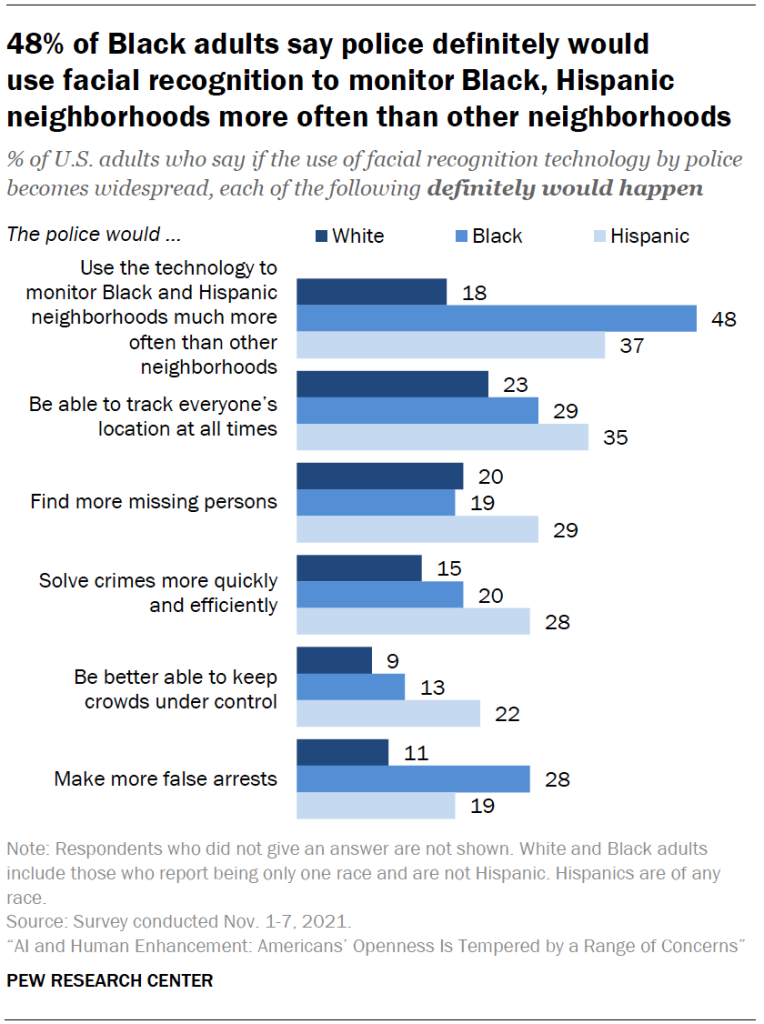
There are some notable differences among racial and ethnic groups on these issues, especially when it comes to those who think these impacts definitely would occur. For instance, 48% of Black adults think police definitely would use facial recognition technology to monitor Black and Hispanic neighborhoods much more often than other neighborhoods, compared with 37% of Hispanic adults. About a fifth of White adults (18%) say the same.
Black adults are also particularly likely to think police would make more false arrests if the use of facial recognition technology by police becomes widespread. Some 28% of Black adults say this would definitely happen, followed by 19% of Hispanics. Just 11% of White adults think police would definitely make more false arrests if they widely used facial recognition technology. Across all six items asked about in this survey, Hispanics are consistently more likely than White adults to think each of these potential outcomes definitely would happen.
Majority of Americans say people should assume they are being monitored when they are in public
Notable portions of people’s lives are now being tracked and monitored by police, government agencies, corporations and advertisers. Prior Pew Research Center work finds that a majority of Americans do not think it is possible to go through daily life without the government or companies collecting data about them. Facial recognition technology adds an extra dimension to this issue because surveillance cameras of all kinds can be used to pick up details about what people do in public places and sometimes in stores. A 2016 study out of Georgetown Law found that half of American adults’ faces were already in law enforcement’s facial recognition databases.
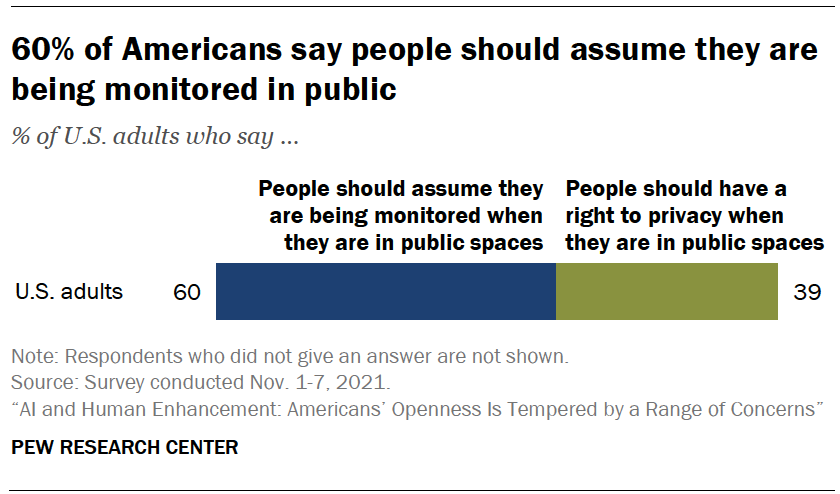
In light of these findings, the Center asked people to pick which of these assertions best describes their views: “People should assume they are being monitored when they are in public spaces” or “People should have a right to privacy when they are in public spaces.” Six-in-ten Americans say people should assume they are being monitored when they are in public spaces, while 39% say people should have a right to privacy when they are in public spaces.
Those who think widespread use of facial recognition technology by police is a good idea are more likely to say people should assume they are being monitored in public (71%), compared with those who see this technology as a bad idea for society (46%). People who say they are unsure about the effects of widespread use fall between those who say it’s a good idea and those who say it’s a bad idea, with some 57% saying people should assume they are being monitored when they are in public spaces.
Americans have mixed views on whether use of facial recognition technology will make policing fairer
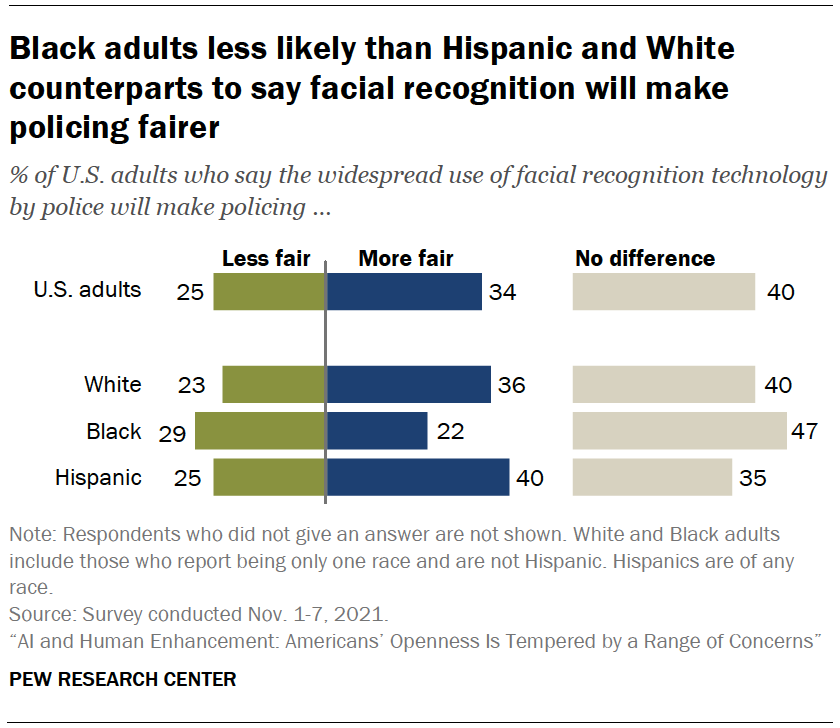
When considering how use of facial recognition technology may affect the fairness of policing, Americans are divided. Some 34% say the widespread use of this technology by police will make policing more fair, while 25% say it will become less fair. Still, four-in-ten do not think this will make a difference.
Hispanic adults (40%) and White adults (36%) are more likely than Black adults (22%) to say the widespread use of facial recognition technology will make policing more fair. There are also some differences between those who generally have positive or negative feelings about the police’s use of facial recognition technology. For example, Americans who say the use of this technology by police is a good idea for society are far more likely than those who say it is a bad idea to say widespread use of the technology by police will make policing more fair (58% vs. 10%).
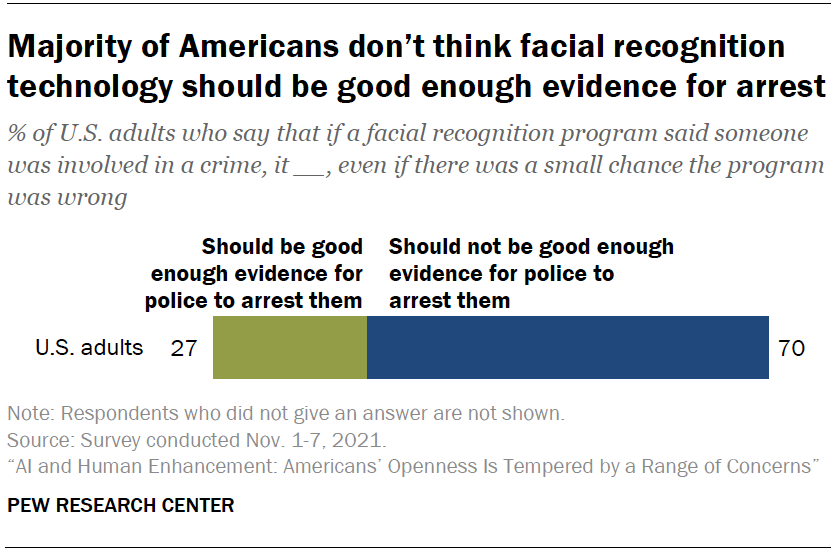
The Center asked a more general question of how facial recognition findings should be considered as evidence: “If a facial recognition program said that someone was involved in a crime, should that be good enough evidence for police to arrest them, even if there was a small chance the program was wrong?” A majority of Americans say they do not think a facial recognition match is sufficient cause for arrest. Seven-in-ten say that if a facial recognition program said that someone was involved in a crime, it should not be good enough evidence for police to arrest them. Roughly a quarter of Americans (27%) say that such a program should be good enough evidence for arrest, even if there was a small chance the program was wrong.
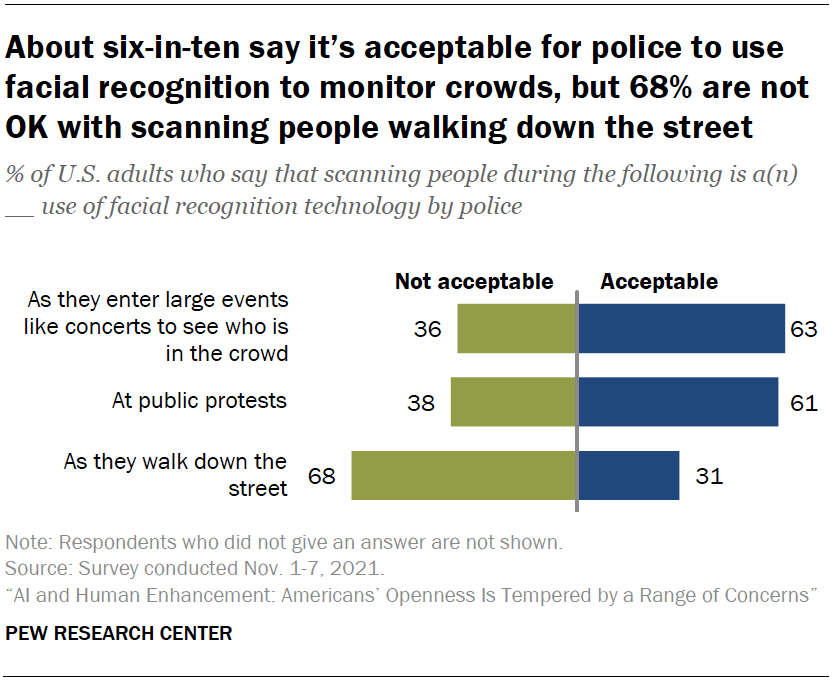
Those who say that the use of facial recognition technology by police is a good idea are more likely to say that a facial recognition program should be good enough evidence for police to make an arrest. Some 40% of these adults say this, compared with 15% of those who say that the use of this tech by police is a bad idea.
Americans are more accepting of the idea that police could use facial recognition in places where crowds gather. About six-in-ten adults say it is an acceptable use of this technology by police to scan people as they enter large events like concerts to see who is in the crowd (63%) or to scan people at public protests (61%). Conversely, 68% of adults say it is not acceptable to scan people as they walk down the street. Just 31% say this is an acceptable use of facial recognition technology by police.
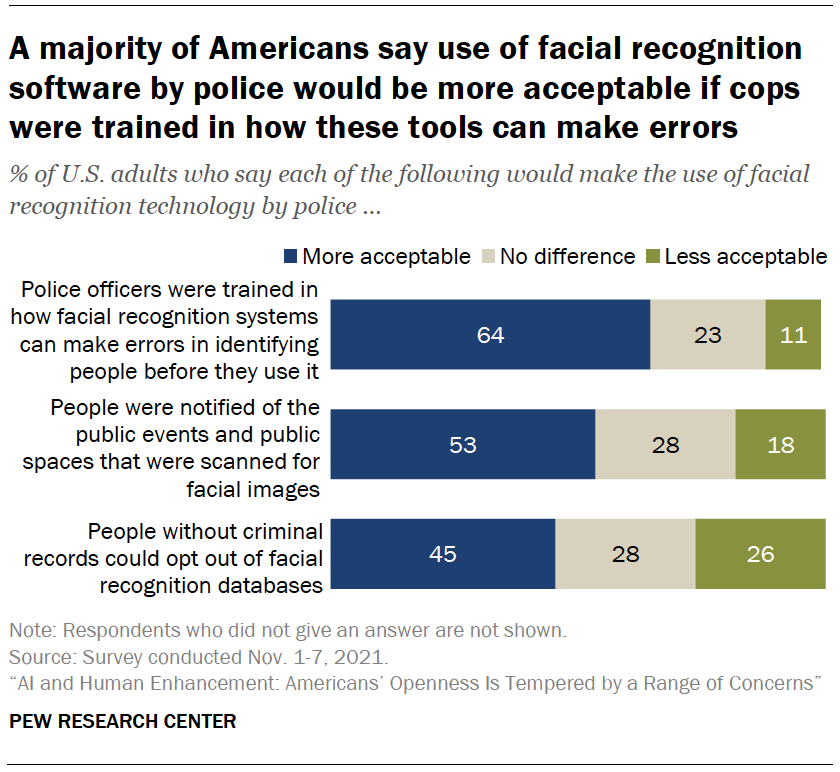
Substantial shares say they would find the use of facial recognition by police more acceptable if certain conditions were met. Some 64% say the use of the technology by police would be more acceptable if police officers were trained in how facial recognition systems can make errors in identifying people before they use it. About half (53%) would find the tech use more acceptable if people were notified of the public events and spaces that were scanned for facial images. By comparison, 45% of Americans say the use of facial recognition technology by police would be more acceptable if people without criminal records could opt out of the facial recognition databases. And roughly a quarter (26%) say the use would be less acceptable under this condition.
About half think police departments, federal agencies should play a major role in setting standards for facial recognition use
When asked about who should be setting standards for facial recognition use by the police, roughly half of Americans say the police departments that use this technology (51%) and federal government agencies (49%) should play a major role. Smaller shares say that companies that develop facial recognition technology (41%) and ordinary people (40%) should play a major role in setting standards for how the technology is used by police.
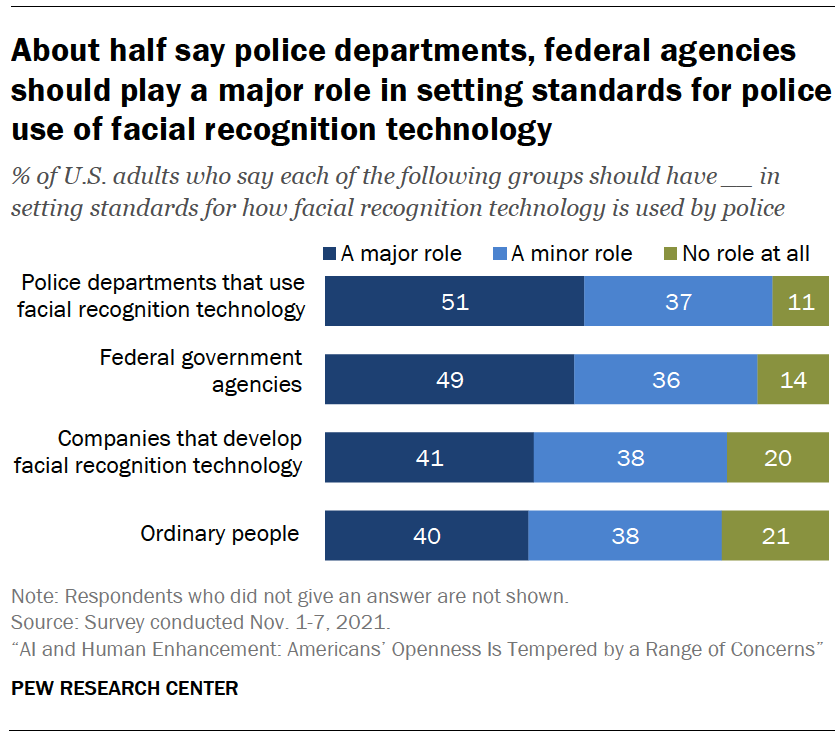
There are differences by party affiliation when it comes to views on the role that the government or police should play in regulating this type of technology. For example, Democrats and those who lean toward the Democratic Party are more likely than Republicans and their leaners to say federal government agencies should play a major role in regulating police use of facial recognition (61% vs. 35%). And 56% of Republicans say police departments using this tech should play a major role in regulating the use, compared with 45% of Democrats.
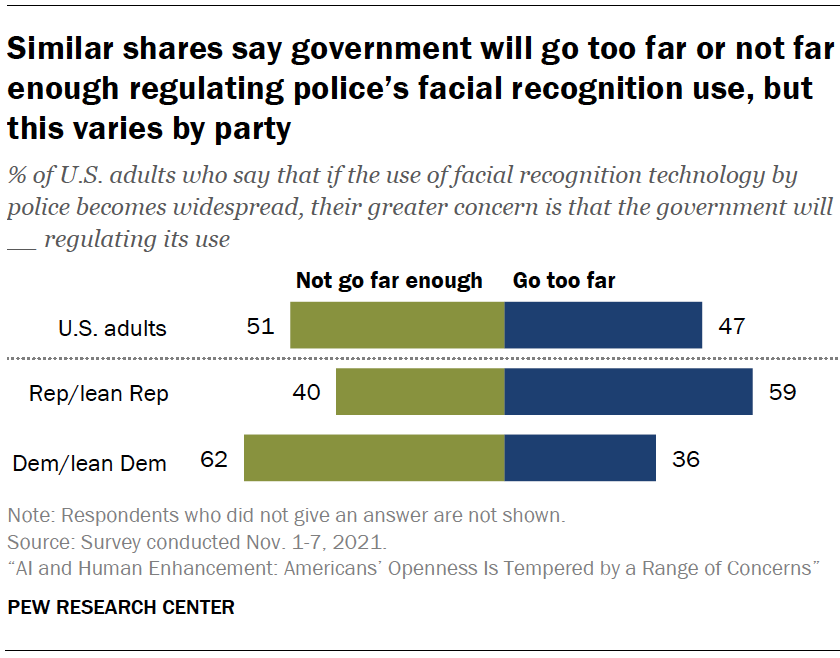
While the vast majority of Americans say government agencies should play at least a minor role in setting standards for the use of facial recognition by police, there is no clear consensus among the public on their greater concern regarding how far the government will go regulating this technology. Some 47% say the government will go too far regulating the widespread use of facial recognition technology by police, and a similar share (51%) say the government will not go far enough.
However, there are some differences by party affiliation on this question. Republicans are more likely than Democrats to say the government will go too far regulating the technology (59% vs. 36%). At the same time, Democrats are especially likely to say the government will not go far enough in their regulation: 62% say this, compared with 40% of Republicans.
Majority opposes facial recognition use by social media sites; about half favor its use by retail stores, apartment buildings
There are a number of other possible uses of facial recognition technology beyond law enforcement applications, and this survey sought public views about several of them. Americans’ views about facial recognition technology vary depending on the application and context.

Roughly half of U.S. adults say they favor the use of facial recognition technology for security purposes, such as retail stores enhancing credit card payment security by confirming account holders at checkout (53%) or apartment buildings tracking who enters or leaves their building (51%).
Conversely, 57% of Americans oppose social media sites automatically identifying people in photos, and about half of Americans say they oppose companies automatically tracking the attendance of their employees.
There are also segments of the population that are not sure whether they oppose or favor these applications. About a fifth of Americans across each of these four applications say they are not sure whether they favor or oppose the use of facial recognition for these purposes.




